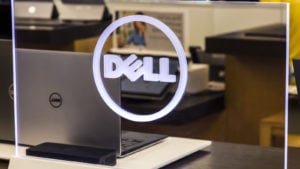I believe tech stocks will continue to be the primary engine of market-beating returns for long-term investors. The world is only becoming more digital, and the top tech firms are positioned to capitalize on key trends like cloud computing, artificial intelligence (AI), quantum computing, and more. While past performance doesn’t guarantee future returns, the leading tech stocks have shown remarkable resilience and earnings power that should enable them to keep marching higher.
That’s why I believe every portfolio should maintain a healthy allocation to quality technology stocks – they are simply unmatched when it comes to wealth creation over long time horizons. Let’s take a look!
Tech Stocks: Synopsys (SNPS)

Synopsys (NASDAQ:SNPS) is benefiting tremendously from the AI and chip design megatrends. Most of the high-flying semiconductor stocks today are fabless chipmakers – they specialize in researching cutting-edge chip architectures and outsource manufacturing to foundries, mainly in Taiwan. However, these fabless designers rely heavily on Synopsys’ electronic design automation (EDA) software tools to create complex chips optimized for AI, accelerators, and edge devices.
Standard EDA tools cannot meet the unique design needs of neural network chips and customized accelerators. This is where Synopsys shines, providing critical IP blocks and customized design software to enable rapid innovation in AI chips. Synopsys enjoys a very sticky business model – chipmakers depend heavily on Synopsys tools and are reluctant to switch. This has fueled incredibly consistent growth. Synopsys is up over 400% in five years and 53% in the past year alone.
Trading at 41 times earnings, Synopsys is still priced for robust growth despite its sizable run-up. But considering its earnings trajectory, I believe it can continue delivering market-beating returns. The growth may moderate from the past five years as the valuation is now extended. However, Synopsys remains a long-term winner.
Dell (DELL)

Dell (NYSE:DELL) is quickly cementing itself as a premier PC brand, though HP and Lenovo still lead in global unit sales. With Lenovo (OTCMKTS:LNVGY) unlikely to dominate in Western markets given geopolitical tensions, Dell and HP (NYSE:HPQ) should maintain a PC duopoly for the foreseeable future. Dell has seen slowing growth recently – FY2023 revenue declined to $88 billion from $102 billion but profits still expanded.
Analysts now expect Dell to deliver near mid-single-digit revenue growth ahead alongside double-digit EPS expansion. Despite this growth outlook, Dell has surged 184% in the past year and now trades at 14 times forward earnings and 0.8 times sales. I believe Dell remains undervalued because its burgeoning AI server business can catalyze stronger growth than expected. Dell is aggressively targeting the AI server market with specialized platforms like the PowerEdge XE9680. The company recently doubled its backlog to $2.9 billion with $800 million in filled orders last quarter, evidencing robust demand.
Dell’s strategic push into AI servers and related infrastructure positions it well to exceed modest growth expectations. The company’s dominance in PC and laptop sales also provides a stable source of cash flow to fund growth initiatives. While not flashy, Dell’s reasonable valuation and pivot toward AI make it an attractive long-term portfolio holding.
Tech Stocks: IBM (IBM)

I noted nearly two years ago that IBM (NYSE:IBM) was transforming itself into a high-growth business focused on AI, cloud, and quantum computing – and the results are coming to fruition. While consensus forecasts still call for sluggish mid-single-digit growth, I believe IBM can handily exceed expectations. According to Polaris Market Research, the global IBM Watson services market alone could reach $16.5 billion by 2027, growing at a 31% CAGR.
Cloud and software services now account for most of IBM’s revenue mix. With its Red Hat acquisition, IBM became one of the world’s biggest hybrid cloud providers. And in quantum computing, IBM maintains an insurmountable lead. No other major tech company comes close on this front.
Quantum will be the next major computing wave after AI, and IBM is primed to ride this tidal shift. Though still losing money, IBM’s quantum segment is a long-term bet. The market continues to underestimate IBM’s revitalized business model. I remain confident that IBM has much more upside ahead now that it has pivoted to cutting-edge technologies.
Amazon (AMZN)

When it comes to dominating the future of cloud, data, and AI, no big tech company has executed as successfully as Amazon (NASDAQ:AMZN). The company has transformed itself from a modest online bookseller into the world’s largest provider of cloud data center capacity. And Amazon continues making aggressive inroads into AI through widespread implementation across its products and services.
Many believe Amazon’s valuation has become excessive and limits its potential upside. However, I strongly disagree. This company has consistently delivered outstanding long-term execution. Consensus forecasts call for EPS to quadruple over the next decade alongside double-digit annual revenue growth potentially exceeding $1.5 trillion by 2030. But with Amazon’s relentless innovation across high-growth segments, I believe these projections could prove conservative.
Amazon trades roughly in line with its 2020/2021 price levels. Given its peerless strategic positioning and execution, I see substantial additional upside potential to $250 or higher over the next five years.
Tech Stocks: DoorDash (DASH)

This pandemic darling plunged 82% from peak to trough as investors feared the worst. But DoorDash (NASDAQ:DASH) has shown itself to be far more than a stay-at-home stock. Growth re-accelerated in late 2023, with DoorDash surging over 207% off its lows. The convenience and popularity of food delivery, especially among younger demographics, continue propelling the company higher.
According to Gloria Foods, 86% of Americans order food delivery at least monthly. This ubiquitous demand gives DoorDash ample runway for expansion. Consensus forecasts call for EPS to double from 2024 to 2026 alongside 16% average annual revenue growth over the next three years. With a rock-solid balance sheet carrying $4 billion in cash against only $522 million in debt, DoorDash has significant resources to fuel additional growth.
Food delivery adoption should have a long tailwind as millennials and Gen Z drive demand.
GoDaddy (GDDY)

GoDaddy (NYSE:GDDY) has captured a substantial market share in web domains and hosting by offering low-cost solutions for individuals and small businesses establishing an online presence. With its household brand name and aggressive marketing, GoDaddy tends to be one of the first options entrepreneurs consider when creating a website.
It trades at a reasonable 25 times forward earnings. However, GoDaddy still has solid growth ahead. Consensus forecasts call for EPS to jump from $4.70 in 2024 to $16 by 2030, with high single-digit annual revenue expansion. GoDaddy’s net margins are also superior to over 98% of software peers.
As long as people continue launching new websites and businesses, GoDaddy should maintain its commanding position in affordable web domains and hosting. The company faces some competitive threats but has built a difficult-to-displace brand identity through effective advertising and customer experience focus. GoDaddy remains well-positioned as a long-term growth and income play.
Cloudflare (NET)

Cloudflare (NYSE:NET) dominates among small and medium businesses that lack in-house cybersecurity expertise. If you browse the web extensively, you’ve likely encountered Cloudflare captchas and messages on smaller sites – evidence of their substantial reach.
Cloudflare already powers over 76% of websites using content delivery networks, which are critical for performance and search engine optimization (SEO). The company has ample room for continued expansion alongside the internet.
Consensus estimates call for EPS to grow from 58 cents in 2024 to $10 by 2030, with revenue expansion from $1.7 billion to $11.5 billion. The company’s growth story still has miles to run.
On the date of publication, Omor Ibne Ehsan did not hold (either directly or indirectly) any positions in the securities mentioned in this article. The opinions expressed in this article are those of the writer, subject to the InvestorPlace.com Publishing Guidelines.
Omor Ibne Ehsan is a writer at InvestorPlace. He is a self-taught investor with a focus on growth and cyclical stocks that have strong fundamentals, value, and long-term potential. He also has an interest in high-risk, high-reward investments such as cryptocurrencies and penny stocks. You can follow him on LinkedIn.
